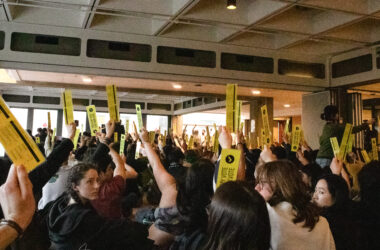 thelink.theorem.ca
thelink.theorem.caOn January 20, Ashraf Azar, a Concordia University student expelled for plagiarism in 2004, entered the Quebec Superior Court to begin a new lawsuit against Concordia. This lawsuit, unlike the previous one filed in 2007, seeks a court injunction in place of monetary damages.
“If I really had the opportunity to move on, I would have,” Azar said, describing his battle with Concordia. “But I haven’t been given the opportunity.”
The incident at the centre of the lawsuit occurred in 2004 during what would have been Azar’s last semester at Concordia. Azar was accused of breaking and entering into a professor’s office and stealing academically important material, an accusation Azar vehemently denied. This charge led to an academic hearing where, according to Azar, a university-sponsored advocate advised him to plead guilty for a promise of leniency. Instead, Azar found himself expelled only a few weeks before he would have earned his diploma.
“The strange part about the breaking and entering,” Azar said, “is that there was no police or security report ever filed.”
Concordia University refused to comment on the case.
“I was found guilty of plagiarism … in a course I was not registered in, in a program I was not in, with a professor I had never seen,” Azar added. “They don’t have any evidence [against me], aside from my testimony.”
Speaking about his confession to the charge and subsequent retraction of it, Azar said, “It’s difficult … for a lot of people to comprehend admitting to a mistake … and then recanting it … the thing is that advocacy has a history with other students of telling them to take the blame for things they did not do.”
Azar also claimed he would be able to prove his accusations against the advocacy group in court with evidence from other people’s incidents as well. But Azar may not be given the chance. His first lawsuit against the university, in 2007, was thrown out because he waited too long to file suit. The presiding judge, Justice Israel Mass, wrote in his ruling, “this is four years later and we are certainly beyond reasonable delay [in filing suit].”
Azar claims he delayed filing suit because his first move after his expulsion was to try negotiating with Concordia. When Concordia offered him a year’s probation in exchange for a guilty plea, Azar refused because he did not want to have to confess to a crime he did not commit. He then obtained what he describes as “incorrect” legal advice in 2006. This, according to Azar, caused the delay in filing which led to the late lawsuit. Azar initially sued the school for $13.5 million in damages.
Justice Mass claimed he had no evidence that Azar had ever sought legal representation. Azar appealed Mass’s decision in 2009, but his appeal was rejected.
Azar, who represented himself in his 2007 lawsuit and is now doing the same, maintains that his case was unjustly dismissed.
“Once you enter into the court system,” he said, “you realize justice is a privilege rather than a right.” He said that his experience has been one of what he calls “institutionalized injustice” and hopes that he can rectify this with his suit
When Azar, who is married and is a soon to be father of three, was asked what he would do if, after seven years, if he was finally allowed a new disciplinary hearing, he simply replied, “I’d get my day [in court].”








